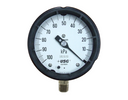
Gauge Sensor: High-Precision Measurement Solutions for Industry
, by Alif Vasaya, 5 min reading time

, by Alif Vasaya, 5 min reading time
Discover how gauge sensors deliver accurate force and strain measurement for industrial, research, and engineering applications.
In modern engineering and manufacturing, accuracy is everything. Whether testing stress in materials, monitoring machinery performance, or ensuring structural integrity, gauge sensors play a vital role. These devices convert mechanical changes like strain, force, or pressure into electrical signals, offering precise and reliable measurement. In this article, we’ll break down what gauge sensors are, their working principle, applications, and how they add value across industries.
A gauge sensor is a transducer designed to detect strain or deformation in a material and translate it into an electrical output. The most common form is the strain gauge sensor, which relies on the principle that the electrical resistance of a conductor changes when stretched or compressed.
Core Principle: Resistance varies with strain.
Output: A measurable electrical signal proportional to force or pressure applied.
Form Factor: Often mounted on a load cell, pressure sensor, or torque transducer to monitor forces accurately.
Gauge sensors operate using the strain-resistance principle:
A thin conductive foil is bonded to a backing material.
When the material deforms (due to applied force or pressure), the foil stretches or compresses.
This deformation alters the resistance of the foil.
The resistance change is measured via a Wheatstone bridge circuit, translating mechanical force into an accurate electrical signal.
This simple yet powerful mechanism makes gauge sensors a cornerstone of modern measurement technology.
Gauge sensors are found across industries where accuracy and reliability are non-negotiable:
Industrial Weighing: Integrated into load cells for precision weighing systems.
Aerospace & Automotive: Stress analysis on aircraft wings, vehicle chassis, and components.
Robotics: Force feedback in robotic arms and automation systems.
Research & Development: Monitoring materials under test conditions.
Construction & Civil Engineering: Measuring stress and strain in bridges, buildings, and tunnels.
High accuracy and sensitivity.
Compact and versatile design.
Compatible with digital data acquisition systems.
Long service life with proper installation.
Suitable for both static and dynamic force measurement.
Q1: What’s the difference between a gauge sensor and a strain gauge?
A strain gauge is the sensing element, while a gauge sensor often refers to a packaged device that includes the strain gauge plus housing and circuitry.
Q2: Can gauge sensors be used for high-load applications?
Yes, when integrated into robust load cells, gauge sensors handle anything from laboratory testing to heavy industrial loads.
Q3: How accurate are gauge sensors?
With proper calibration, they deliver high accuracy within ±0.1% to ±0.5% of rated output, depending on the application.
Q4: Do gauge sensors require regular maintenance?
Minimal—though periodic calibration ensures ongoing accuracy.
The gauge sensor is an indispensable tool in today’s industrial and research environments. From weighing systems to aerospace testing, its ability to deliver accurate, reliable, and repeatable data makes it a cornerstone of precision measurement.
Looking to integrate high-quality gauge sensors into your systems? Explore our full range of load cells, pressure sensors, and force gauges to find the right solution for your needs.
For further reading, you can check standards and guidelines from NIST to understand calibration and accuracy benchmarks.